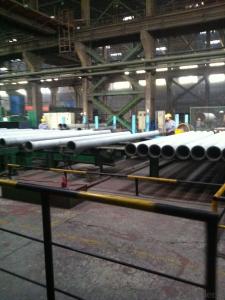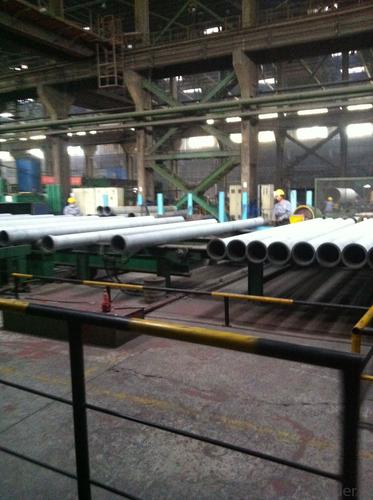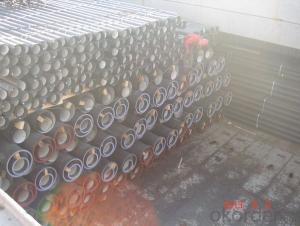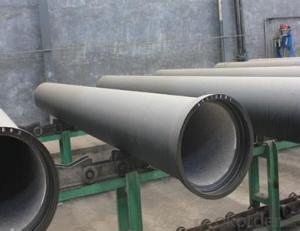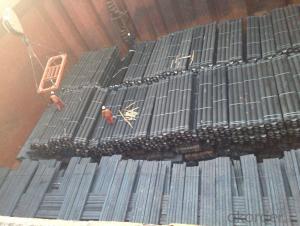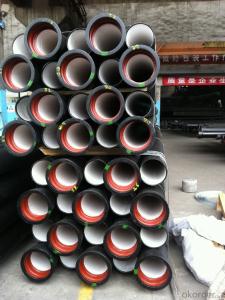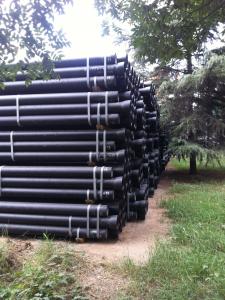DUCTILE IRON PIPEs K8CLASS DN100
- Loading Port:
- Tianjin
- Payment Terms:
- TT OR LC
- Min Order Qty:
- 23 pc
- Supply Capability:
- 3000 pc/month
OKorder Service Pledge
OKorder Financial Service
You Might Also Like
Specifications
· Material : Ductile Cast Iron
· Size Range : DN 80mm to DN 2000mm
· Unit Effective Length : 6m or 5.7m
· Manufacture Standard: ISO 2531:1998/ EN 545:2006/EN 598:2007
· Annual capacity : 200,000 tons
· Coating Exterior: Zinc 130g/m2 according to ISO 8179-1 and bitumen coating 70 microns.
· Cement Interior: Portland Cement/ High Alumina Cement/ Sulphate Resisting Cement Lining according to ISO 4179
· Special requirements on external coating and internal lining can be applied
· We also provide accessories such as SBR/EPDM rubber gaskets, lubricant paste, pipe caps, PE sleeves, etc.
Additional Parts:
Each pipe is strictly inspected according to related standard to ensure permanently high performance.
Easy Installation at site and service free for life
Long Service Lifespan
Quotation will arrive you within 24hours once we get your inquiry.
We guarantee offering you a competitive price.
A copy of original inspection reports of pipes will be offered after shipment.
Photos of loading process will be sent to the customer after shipment effect.
We will follow-up the delivery progress after shipment effect and update to the customer on weekly basis.
- Q: Are ductile iron pipes suitable for use in irrigation gate systems?
- Indeed, irrigation gate systems can benefit from the use of ductile iron pipes. Ductile iron, a variant of cast iron, boasts superior strength and flexibility, rendering it a reliable and long-lasting option for applications like irrigation gate systems. Ductile iron pipes are famed for their remarkable tensile strength and resistance to corrosion, features that are crucial for preserving the integrity of the irrigation system. Moreover, these pipes can endure high pressure and offer an extended lifespan, making them a cost-efficient solution for irrigation gate systems. In summary, the strength, durability, and corrosion resistance of ductile iron pipes make them highly suitable for use in irrigation gate systems.
- Q: Are ductile iron pipes resistant to UV degradation?
- UV degradation is not something that ductile iron pipes naturally resist. When they are exposed to sunlight, the UV radiation can cause degradation in various materials, including ductile iron. However, it is important to understand that the rate at which ductile iron pipes degrade due to UV radiation is relatively slow when compared to materials like plastics or rubber. To prevent UV degradation from negatively impacting ductile iron pipes, protective actions can be taken. These can include coating the pipes with a paint that is resistant to UV radiation or applying an external protective layer. By doing so, the impact of UV radiation can be minimized. Additionally, proper installation and maintenance practices can also contribute to the longevity and durability of ductile iron pipes. It is worth noting that while UV degradation may not be the main concern for ductile iron pipes, other factors like corrosion, chemical attack, or mechanical stress can still affect their performance and lifespan. Therefore, it is important to consider all potential environmental factors and take appropriate protective measures accordingly.
- Q: How do ductile iron pipes handle ground movement in earthquake-prone areas?
- In earthquake-prone areas, ductile iron pipes are highly regarded for their exceptional resistance to ground movement. These pipes are specifically designed to endure external forces, including seismic activities and shifting ground. The remarkable flexibility of ductile iron pipes allows them to effectively absorb and distribute the energy generated during ground movement. This flexibility is achieved through the unique composition of ductile iron, which contains nodular graphite in its microstructure. The presence of nodular graphite grants the pipe with ductility and resilience, enabling it to deform under stress without breaking. During an earthquake, when the ground begins to shift, ductile iron pipes have the capacity to adapt to the changing conditions. They can elongate, compress, and bend, thereby reducing the likelihood of pipe failure. This characteristic is of utmost importance in earthquake-prone areas, as it helps prevent catastrophic failures and water loss that may occur with more rigid pipe materials. Furthermore, ductile iron pipes possess a high level of joint integrity, further enhancing their ability to withstand ground movement during seismic events. The joints of these pipes are engineered to withstand lateral and angular movement, ensuring their integrity and preventing leaks. In addition to their inherent flexibility, ductile iron pipes are often installed using techniques that enhance their resistance to ground movement. Anchoring systems, such as thrust blocks and restraints, can be employed to secure the pipes and prevent excessive movement. These systems contribute to the stability of the pipeline network and further minimize the potential for damage during earthquakes. Overall, the combination of ductility, joint integrity, and anchoring systems make ductile iron pipes an exceedingly reliable choice for managing ground movement in earthquake-prone areas. They offer a durable and resilient solution that can withstand the challenges posed by seismic activities, guaranteeing a continuous water supply and minimizing the risk of infrastructure damage.
- Q: How does ductile iron pipe perform in areas with high groundwater salinity?
- Due to its inherent resistance to corrosion, ductile iron pipe is highly effective in areas with high groundwater salinity. The presence of elevated levels of salt and minerals in the groundwater can lead to the corrosion and deterioration of certain materials, but ductile iron is highly resilient to this type of corrosion. Its composition and manufacturing process make it less susceptible to damage from corrosive elements found in high salinity water. The primary reason for the corrosion resistance of ductile iron pipe lies in its protective iron oxide coating, which naturally forms on both the interior and exterior surfaces of the pipe. This coating acts as a barrier, preventing direct contact between the pipe and the corrosive elements present in the groundwater. Additionally, ductile iron pipes are often lined with cement mortar or a protective epoxy coating, further enhancing their resistance to corrosion and providing an extra layer of protection. Moreover, ductile iron pipe boasts an extended lifespan, often surpassing 100 years, making it an ideal choice for areas with high groundwater salinity. Its durability and resistance to corrosion ensure that it can withstand the harsh conditions associated with high salinity environments, minimizing the frequency of repairs or replacements. In conclusion, ductile iron pipe is an exceptional option for areas with high groundwater salinity due to its corrosion resistance properties. Its protective iron oxide coating, along with optional linings, offers a dependable and long-lasting solution, guaranteeing the integrity and performance of the pipe system even in demanding environments.
- Q: How are ductile iron pipes tested for quality assurance?
- Ductile iron pipes undergo various testing procedures to ensure their quality and meet industry standards. These quality assurance tests are conducted on both raw materials and finished products to ensure the durability, strength, and overall reliability of ductile iron pipes. One of the initial tests is the chemical analysis of the raw materials used in manufacturing the pipes. This analysis ensures that the composition of the iron, carbon, and other elements is within the specified range, as different compositions can affect the pipe's strength and corrosion resistance. Next, mechanical tests are performed to evaluate the strength and ductility of the pipes. Tensile tests are conducted to determine the ultimate tensile strength, yield strength, and elongation properties of the pipe. This helps in assessing the pipe's ability to withstand external pressure or bending forces. Additionally, impact tests are performed to evaluate the pipe's resistance to sudden loading or impact. This test measures the energy absorbed by the pipe when subjected to a high impact force, ensuring that it can withstand potential accidental impacts during installation or operation. Another critical test is the hydrostatic pressure test, which checks the pipes' ability to withstand internal pressure. In this test, the pipes are filled with water and subjected to a specified pressure for a specific duration. This ensures that the pipes can withstand the expected operating pressure without any leakage or failure. Furthermore, dimensional and visual inspections are conducted to ensure that the pipes meet the required specifications. These inspections include checking the pipe's outer diameter, length, wall thickness, and overall appearance for any defects, such as cracks, voids, or irregularities. Lastly, corrosion resistance tests are performed to assess the pipe's ability to resist corrosion when exposed to different environments or fluids. This helps in determining the expected lifespan of the pipes and their suitability for various applications. Overall, these quality assurance tests play a crucial role in ensuring that ductile iron pipes meet the required standards and provide reliable and long-lasting performance in various infrastructure projects.
- Q: How does ductile iron pipe compare to PVC pipe in terms of strength?
- Generally, ductile iron pipe is considered stronger than PVC pipe due to its composition of iron and carbon, which provides it with high tensile strength and resistance to breakage. It is commonly utilized in heavy-duty applications like water mains, sewer lines, and industrial piping due to its ability to withstand high pressures. On the flip side, PVC pipe is manufactured using a plastic material known as polyvinyl chloride. While PVC pipe is lightweight and easy to handle, it lacks the strength of ductile iron pipe. It is typically used in low-pressure applications such as household plumbing, irrigation systems, and drainage pipes. When comparing the strength of ductile iron pipe to PVC pipe, the former has a greater capacity to handle heavy loads, endure ground movement, and resist damage from external factors like rocks or tree roots. Additionally, ductile iron pipe is more durable and has a longer lifespan in comparison to PVC pipe. However, it is important to consider that the choice between ductile iron pipe and PVC pipe ultimately depends on the specific requirements of the project. Factors such as cost, environmental conditions, ease of installation, and desired longevity should all be taken into account when determining the appropriate type of pipe to utilize.
- Q: How do ductile iron pipes handle differential settlement?
- Ductile iron pipes possess exceptional durability and are renowned for their ability to endure diverse environmental conditions, including differential settlement. Differential settlement refers to the uneven settling of the ground, which can often impose stress and strain on underground pipes. Specifically engineered to address settlement issues, ductile iron pipes exhibit inherent flexibility and strength. These pipes possess the capacity to flex and accommodate slight ground movements without incurring significant damage or failure. The flexibility of ductile iron pipes enables them to evenly distribute the stress and strain caused by differential settlement along their length. This characteristic assists in averting concentrated stress points that could potentially result in cracks or fractures in the pipe. Furthermore, the inherent strength of ductile iron pipes equips them with the necessary resistance to withstand the forces generated by differential settlement. The pipes' robust construction and high tensile strength render them less susceptible to deformation or damage caused by ground movements. Moreover, ductile iron pipes are commonly installed with flexible joints, such as rubber gaskets or push-on joints. These joints permit some movement and adapt to any slight misalignment or settlement that may occur. By providing flexibility at the joints, the pipes can better adjust to changes in ground conditions and diminish the risk of failure. In conclusion, ductile iron pipes possess the necessary attributes to effectively cope with differential settlement due to their flexibility, strength, and utilization of flexible joints. These features guarantee that the pipes can endure ground movements and continue to function efficiently without compromising their integrity or longevity.
- Q: What does "K8" mean in ductile iron pipe grades?
- 1 ductile iron pipe grade K8, on behalf of the ductile iron 8 grades, K refers to the wall thickness coefficient, the higher the grade, the greater the pressure, the lower the level, the less pressure to bear.2 wall thickness calculation formula: e=K (0.5+0.001DN).
- Q: What are the interface forms of ductile iron pipes? The best drawings are available. Thank you
- There are many kinds of ductile iron pipe interfaces, and the T type interface (sliding type) flexible interface is famous for its fast installation and simple installation.
- Q: Are ductile iron pipes suitable for use in food processing plants?
- Yes, ductile iron pipes are suitable for use in food processing plants. Ductile iron is highly durable and corrosion-resistant, making it suitable for transporting various fluids in food processing facilities. Additionally, ductile iron pipes are approved for use in potable water systems, further indicating their suitability for food-related applications.
Send your message to us
DUCTILE IRON PIPEs K8CLASS DN100
- Loading Port:
- Tianjin
- Payment Terms:
- TT OR LC
- Min Order Qty:
- 23 pc
- Supply Capability:
- 3000 pc/month
OKorder Service Pledge
OKorder Financial Service
Similar products
Hot products
Hot Searches
Related keywords
